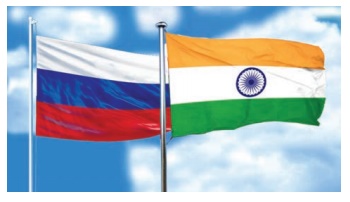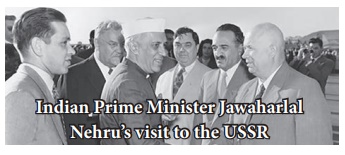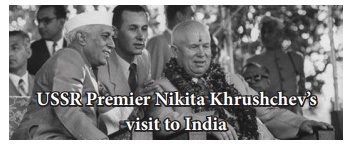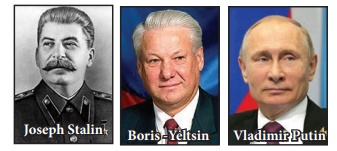Chapter: 12th Political Science : Chapter 9 : India and the World
India-Russia Relations
IndiaŌĆōRussia Relations

Indian-Soviet Union Relations (1947-1991)

The Soviet Union was IndiaŌĆÖs closest friend and a
strategic partner since 1947. The relationship between the two countries has
withstood several challenging geopolitical circumstances. Unlike the USA,
Russia has historically understood and respected IndiaŌĆÖs strategic autonomy. It
views India as an ancient civilisation rich in culture, knowledge systems and
wisdom. This basic quality of the relation has enabled the bilateral ties to flourish
over the years.
Initially, when India became free, the Soviet Union
(USSR) under the leadership of Joseph Stalin was suspicious of the genuineness
of IndiaŌĆÖs independent policy of non-alignment. However, India-Soviet bonhomie
started with the Indian Prime Minister Jawaharlal NehruŌĆÖs visit to the USSR in
June 1955 which was followed by the Soviet Premier Nikita KhrushchevŌĆÖs visit to
India in December 1955.

This was also the time when India adapted
Soviet-style state planning and a ŌĆśsocialistic pattern of societyŌĆÖ. In this
era, the USSR used instruments of aid, trade and diplomacy in developing
countries to limit Western influence. Subsequently, India-Soviet relations
flourished over the decades in the fields of metallurgy, defence, energy and
trade sectors.
The India-Soviet Treaty of Peace, Friendship and
Cooperation was signed by the two sides in 1971. This was a landmark in the
relationship between the two countries.
During the IndiaŌĆōPakistan war in 1971, the USSR
took a firm position in favour of India and sent ships to the Indian Ocean to counter
any move by the USA, which had already sent its 7th Fleet into the Bay of
Bengal. The results of the 1971 IndiaŌĆō Pakistan war and emergence of Bangladesh
established a trusted partnership between India and the USSR.
India-Russian Relations (1991- present)
With the fall of the USSR in 1991,
bilateral relations between Russia and India went through a period of
uncertainty. The Treaty of 1971 became ineffective as the Soviet regime no longer
existed. Russia was also pressed to shift its focus towards domestic affairs
and its relations with the USA and Europe. India now had to deal with a Russia
which did not have an interest nor the resources for developing its ties with other
nations.
During his visit to New Delhi in 1993, the Russian
President Boris Yeltsin signed a new Treaty of Friendship which was an effort to
rekindle the spirit in which the 1971 Treaty was signed. However, the
fundamental character of the Treaty was transformed as the new Treaty just
called for regular consultation and coordination in case of any threat to peace.
Unlike in the Soviet era, Yeltsin described India as a ŌĆśnatural partnerŌĆÖ but he
did not give the impression of a ŌĆśspecial relationshipŌĆÖ. Though the
relationship continued between the two countries in the early 1990s, the
ŌĆśbenign neglectŌĆÖ of India by Russia in this period was evident.

Deal for S-400 Air Defence System
India and Russia have formally inked
the $ 5.2 billion deal for S-400 system in the year 2018.The air defence system
is expected to be delivered by the year 2020. 400 Triumf is an advanced
surface-to-air missile system, developed by RussiaŌĆÖs state-owned company
Almaz-Antey, and can shoot down hostile aircraft and ballistic missiles. It has
an estimated range of 250 kilometres and a possible upgrade is speculated to extend
it to 400 kilometres.
The new Russian leadership under Vladimir Putin
(President, 2000ŌĆōpresent) reversed the Yeltsin-era drift in India-Russia
bilateral relations. Russia signed the Declaration on Strategic Partnership
with India in 2000 and established the institution of annual summit meetings.
Its declaration was further elevated to the level of ŌĆ£Special and Privileged
Strategic PartnershipŌĆØ in 2010. Moscow realized that as a Eurasian power, an
active Russian role in an emerging Asia would be limited without a solid
partnership with old friends like India.
Areas of Cooperation
Currently, India is the largest importer of Russian
defence equipment. The defence facet of the relationship is one of the
strongest pillars of the India-Russia relationship and has gone through the
test of time. Russia is also the only country that lays emphasis on sharing
high-end defence technology with India which highlights the mutual trust
between the two countries.
India, Russia and other neighbouring countries are
engaged in efforts to operationalise the International North-South Transport
Corridor (INSTC) which promises to propel connectivity and trade relations
between the two countries.
India and Russia deeply cooperate in a diverse set
of areas which includes nuclear energy, trade, oil and gas, space program,
science and technology, at the UN, BRICS, SCo and other international fora. The
two countries share common ground on critical global challenges such as
terrorism, cybersecurity, climate change, preventing the weaponisation of outer
space and prevention of weapons of mass destruction. Russia also supports
IndiaŌĆÖs permanent membership of the United Nations Security Council. It also has
remained a strong supporter of India in the Kashmir issue which is of IndiaŌĆÖs
core interest.
Related Topics